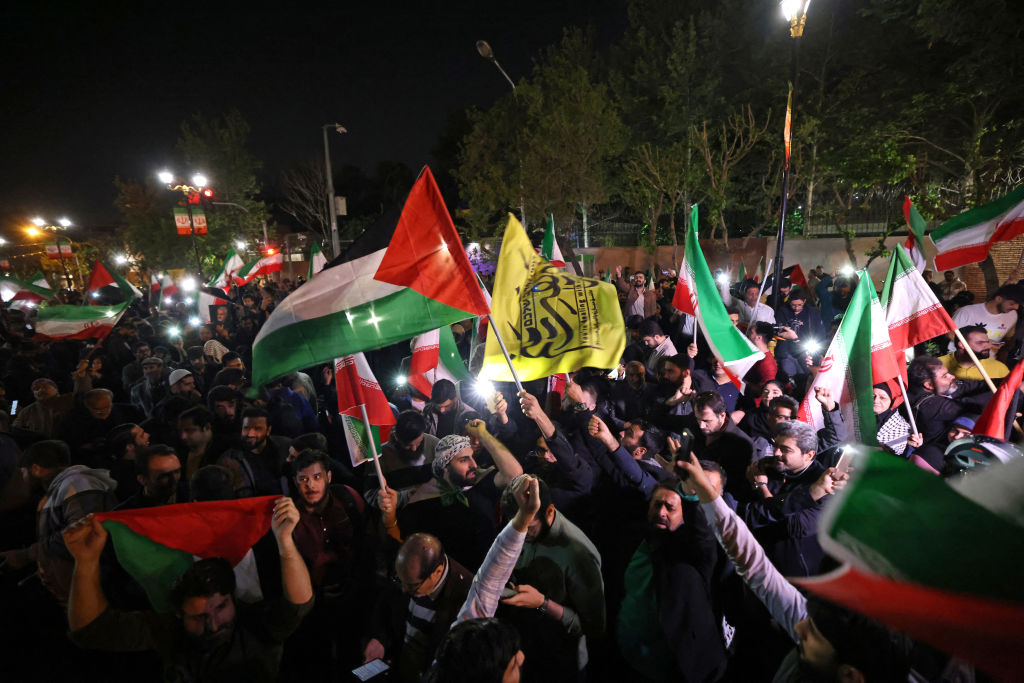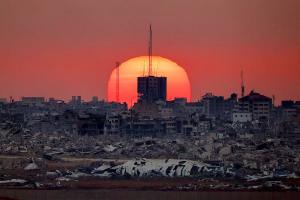Some 300 missiles and drones were dispatched by Iran towards Israel Saturday night, the largest such assault in history. The IDF say 99 percent of them were shot down by the air forces of Israel, the US, the UK and Jordan. So rather than weaken Israel, Iran’s attack has ended up convening showcasing an extraordinary military alliance — with Arabs, Israelis, Americans and British acting as one to neutralize the assault.
Not a single one of the 200 drones or cruise missiles made it into Israel. Only some faster-moving ballistic missiles hit their target and even they inflicted only light damage to the Nevatim air base. The only reported casualty from Saturday night’s unprecedented barrage is a seven-year-old girl from the Bedoin diaspora, who was hurt when shrapnel from the interception of a missile landed on her house in the Negev desert.
“More than thirty cruise missiles were fired,” said an IDF spokesman. “Zero penetrated the territory of Israel. More than 120 ballistic missiles were launched, a number penetrated and fell at the air force base in Nevatim, causing only minor damage. Iran thought that it would be able to paralyze the base and thereby damage the air capabilities, but failed.”
Iran has told the United Nations that no more attacks will be forthcoming and Israel has already delivered its response by hitting a Hezbollah base in Lebanon later on Saturday. British involvement (from the RAF base in Akrotiri) was not technically necessary but all countries wanted to make a show of a joint force — and one that includes the Saudis as well as the Americans. Even France contributed, by patrolling airspace.
The fact that none of the drones or cruise missiles hit their targets does not seem to have dampened the mood
Saturday exposed not just the strength of Israel’s alliance but Iran’s isolation, with worldwide condemnation. Egypt expressed “deep concern” and called for “maximum restraint.” China said it was “deeply concerned about the current escalation.” Qatar called on “all parties to stop.” Jordan said it helped fend off the Iranian attack for its own security as it does not want escalation — indeed, some of the shrapnel from the night’s intercepts fell on Jordanian soil. Jordan also condemned Israel’s campaign in Gaza. Only Hamas congratulated the mullahs on their attack: even Moscow, a major client of Iranian drones, had no words of support.
Given that the drones would have taken nine hours to reach Israel, it’s likely Tehran would have known its attack would flop. But if it was performative then there was political performance as well, with the Iranian parliament convening to chant “death to Israel” (video here). The fact that none of the drones or cruise missiles hit their targets does not seem to have dampened the mood. Hossein Salami, head of Iran’s Revolutionary Guard, said Saturday night marked a new strategy where it will respond to “any aggression directly from Iranian territory” — so the triumph, in other words, is not that the attack caused damage but that it happened at all.
Given that the world has waited for almost two weeks to see how Iran would retaliate for the April 1 attack on its embassy by Israel (itself a response for Iran’s role in the October 7 attacks) this is far from the worst result. If anything, Israel has emerged looking stronger, both militarily and diplomatically. The UN Security Council meets later today, most likely to condemn Iran. But those words will matter a lot less than the fact that on Saturday night the world saw Arab pilots down drones heading to Israel. And Iran, which funds Hamas and Hezbollah, stood exposed as a pariah. Perhaps that is why in Tehran, Tel Aviv and Washington we hear the same message today: there will be no more. For now, at least.
This article was originally published on The Spectator’s UK website.


























Leave a Reply